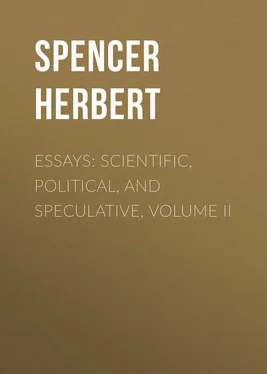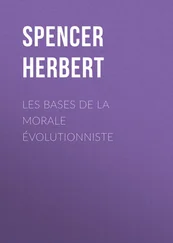Herbert Spencer - Essays - Scientific, Political, and Speculative, Volume II
Здесь есть возможность читать онлайн «Herbert Spencer - Essays - Scientific, Political, and Speculative, Volume II» — ознакомительный отрывок электронной книги совершенно бесплатно, а после прочтения отрывка купить полную версию. В некоторых случаях можно слушать аудио, скачать через торрент в формате fb2 и присутствует краткое содержание. Жанр: Философия, foreign_antique, foreign_prose, sketch, на английском языке. Описание произведения, (предисловие) а так же отзывы посетителей доступны на портале библиотеки ЛибКат.
- Название:Essays: Scientific, Political, and Speculative, Volume II
- Автор:
- Жанр:
- Год:неизвестен
- ISBN:нет данных
- Рейтинг книги:5 / 5. Голосов: 1
-
Избранное:Добавить в избранное
- Отзывы:
-
Ваша оценка:
- 100
- 1
- 2
- 3
- 4
- 5
Essays: Scientific, Political, and Speculative, Volume II: краткое содержание, описание и аннотация
Предлагаем к чтению аннотацию, описание, краткое содержание или предисловие (зависит от того, что написал сам автор книги «Essays: Scientific, Political, and Speculative, Volume II»). Если вы не нашли необходимую информацию о книге — напишите в комментариях, мы постараемся отыскать её.
Essays: Scientific, Political, and Speculative, Volume II — читать онлайн ознакомительный отрывок
Ниже представлен текст книги, разбитый по страницам. Система сохранения места последней прочитанной страницы, позволяет с удобством читать онлайн бесплатно книгу «Essays: Scientific, Political, and Speculative, Volume II», без необходимости каждый раз заново искать на чём Вы остановились. Поставьте закладку, и сможете в любой момент перейти на страницу, на которой закончили чтение.
Интервал:
Закладка:
Were it needful we could fill a score pages with the incongruities of M. Comte’s scheme. But the foregoing samples will suffice. So far is his law of evolution of the sciences from being tenable, that, by following his example, and arbitrarily ignoring one class of facts, it would be possible to present, with great plausibility, just the opposite generalization to that which he enunciates. While he asserts that the rational order of the sciences, like the order of their historic development, “is determined by the degree of simplicity, or, what comes to the same thing, of generality of their phenomena;” it might contrariwise be asserted that, commencing with the complex and the special, mankind have progressed step by step to a knowledge of greater simplicity and wider generality. So much evidence is there of this as to have drawn from Whewell, in his History of the Inductive Sciences , the remark that “the reader has already seen repeatedly in the course of this history, complex and derivative principles presenting themselves to men’s minds before simple and elementary ones.” Even from M. Comte’s own work, numerous facts, admissions, and arguments, might be picked out, tending to show this. We have already quoted his words in proof that both abstract and concrete mathematics have progressed towards a higher degree of generality, and that he looks forward to a higher generality still. Just to strengthen this adverse hypothesis, let us take a further instance. From the particular case of the scales, the law of equilibrium of which was familiar to the earliest nations known, Archimedes advanced to the more general case of the lever of which the arms may or may not be equal; the law of equilibrium of which includes that of the scales. By the help of Galileo’s discovery concerning the composition of forces, D’Alembert “established, for the first time, the equations of equilibrium of any system of forces applied to the different points of a solid body” – equations which include all cases of levers and an infinity of cases besides. Clearly this is progress towards a higher generality – towards a knowledge more independent of special circumstances – towards a study of phenomena “the most disengaged from the incidents of particular cases;” which is M. Comte’s definition of “the most simple phenomena.” Does it not indeed follow from the admitted fact, that mental advance is from the concrete to the abstract, from the particular to the general, that the universal and therefore most simple truths are the last to be discovered? Should we ever succeed in reducing all orders of phenomena to some single law – say of atomic action, as M. Comte suggests – must not that law answer to his test of being independent of all others, and therefore most simple? And would not such a law generalize the phenomena of gravity, cohesion, atomic affinity, and electric repulsion, just as the laws of number generalize the quantitative phenomena of space, time and force?
The possibility of saying so much in support of an hypothesis the very reverse of M. Comte’s, at once proves that his generalization is only a half-truth. The fact is that neither proposition is correct by itself; and the actuality is expressed only by putting the two together. The progress of science is duplex. It is at once from the special to the general, and from the general to the special. It is analytical and synthetical at the same time.
M. Comte himself observes that the evolution of science has been accomplished by the division of labour; but he quite misstates the mode in which this division of labour has operated. As he describes it, it has been simply an arrangement of phenomena into classes, and the study of each class by itself. He does not recognize the effect of progress in each class upon all other classes: he recognizes only the effect on the class succeeding it in his hierarchical scale. Or if he occasionally admits collateral influences and intercommunications, he does it so grudgingly, and so quickly puts the admissions out of sight and forgets them, as to leave the impression that, with but trifling exceptions, the sciences aid one another only in the order of their alleged succession. The fact is, however, that the division of labour in science, like the division of labour in society, and like the “physiological division of labour” in individual organisms, has been not only a specialization of functions, but a continuous helping of each division by all the others, and of all by each. Every particular class of inquirers has, as it were, secreted its own particular order of truths from the general mass of material which observation accumulates; and all other classes of inquirers have made use of these truths as fast as they were elaborated, with the effect of enabling them the better to elaborate each its own order of truths. It was thus in sundry of the cases we have quoted as at variance with M. Comte’s doctrine. It was thus with the application of Huyghens’s optical discovery to astronomical observation by Galileo. It was thus with the application of the isochronism of the pendulum to the making of instruments for measuring intervals, astronomical and other. It was thus when the discovery that the refraction and dispersion of light did not follow the same law of variation, affected both astronomy and physiology by giving us achromatic telescopes and microscopes. It was thus when Bradley’s discovery of the aberration of light enabled him to make the first step towards ascertaining the motions of the stars. It was thus when Cavendish’s torsion-balance experiment determined the specific gravity of the Earth, and so gave a datum for calculating the specific gravities of the Sun and Planets. It was thus when tables of atmospheric refraction enabled observers to write down the real places of the heavenly bodies instead of their apparent places. It was thus when the discovery of the different expansibilities of metals by heat, gave us the means of correcting our chronometrical measurements of astronomical periods. It was thus when the lines of the prismatic spectrum were used to distinguish the heavenly bodies that are of like nature with the sun from those which are not. It was thus when, as recently, an electro-telegraphic instrument was invented for the more accurate registration of meridional transits. It was thus when the difference in the rates of a clock at the equator, and nearer the poles, gave data for calculating the oblateness of the earth, and accounting for the precession of the equinoxes. It was thus – but it is needless to continue. Here, within our own limited knowledge of its history, we have named ten additional cases in which the single science of astronomy has owed its advance to sciences coming after it in M. Comte’s series. Not only its minor changes, but its greatest revolutions have been thus determined. Kepler could not have discovered his celebrated laws had it not been for Tycho Brahe’s accurate observations; and it was only after some progress in physical and chemical science that the improved instruments with which those observations were made, became possible. The heliocentric theory of the Solar System had to wait until the invention of the telescope before it could be finally established. Nay, even the grand discovery of all – the law of gravitation – depended for its proof upon an operation of physical science, the measurement of a degree on the Earth’s surface. So completely, indeed, did it thus depend, that Newton had actually abandoned his hypothesis because the length of a degree, as then stated, brought out wrong results; and it was only after Picart’s more exact measurement was published, that he returned to his calculations and proved his great generalization. Now this constant intercommunion which, for brevity’s sake, we have illustrated in the case of one science only, has been taking place with all the sciences. Throughout the whole course of their evolution there has been a continuous consensus of the sciences – a consensus exhibiting a general correspondence with the consensus of the faculties in each phase of mental development; the one being an objective registry of the subjective state of the other.
Читать дальшеИнтервал:
Закладка:
Похожие книги на «Essays: Scientific, Political, and Speculative, Volume II»
Представляем Вашему вниманию похожие книги на «Essays: Scientific, Political, and Speculative, Volume II» списком для выбора. Мы отобрали схожую по названию и смыслу литературу в надежде предоставить читателям больше вариантов отыскать новые, интересные, ещё непрочитанные произведения.
Обсуждение, отзывы о книге «Essays: Scientific, Political, and Speculative, Volume II» и просто собственные мнения читателей. Оставьте ваши комментарии, напишите, что Вы думаете о произведении, его смысле или главных героях. Укажите что конкретно понравилось, а что нет, и почему Вы так считаете.












